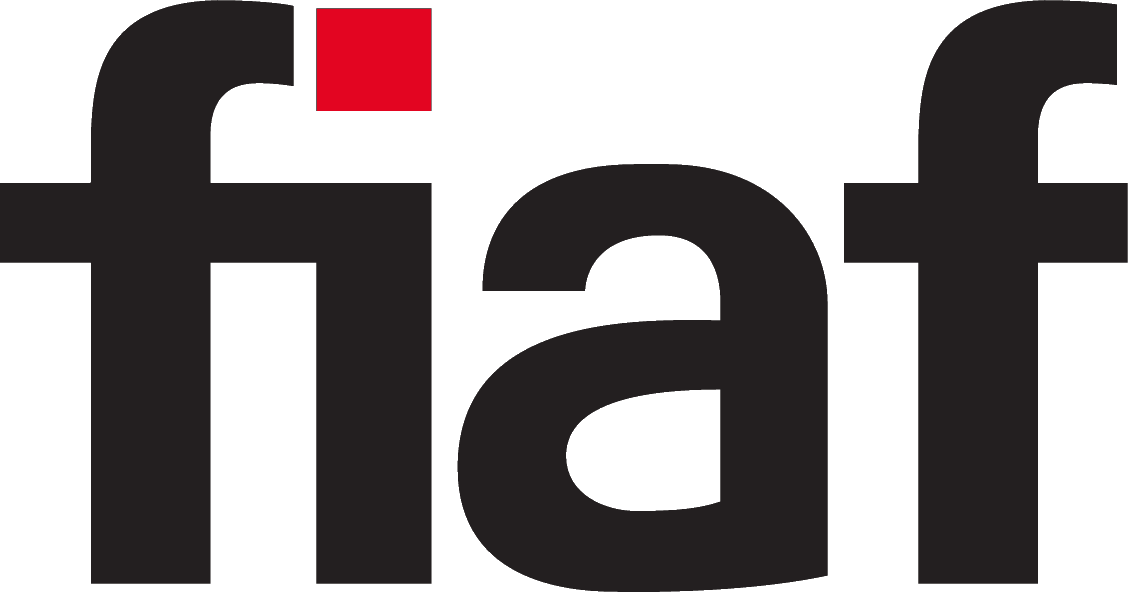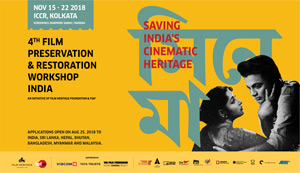Kolkata, 15-22 November 2018
As Bengal celebrates 100 years of cinema, Film Heritage Foundation and FIAF are pleased to announce the fourth Film Preservation & Restoration Workshop India 2018 (FPRWI 2018) in Kolkata from 15 – 22 November 2018. Previous workshops in India took place at the Films Division in Mumbai in 2015, at the National Film Archive of India (NFAI) in Pune in 2016, and at the Prasad Film Labs in Chennai in 2017.
FPRWI 2018 is an initiative of Film Heritage Foundation and FIAF, in association with The Academy of Motion Picture, Arts & Sciences, L’Immagine Ritrovata, Fondazione Cineteca di Bologna, British Film Institute, The Criterion Collection, the Irish Film Institute, the Austrian Film Museum, Eye Filmmuseum, Bundesarchiv (German Federal Archives), the Indiana University Libraries Moving Image Archive, Centre for Creative Photography, University of Arizona, and ARRI.
Venue
Rabindranath Tagore Center, Indian Council for Cultural Relations (ICCR), 9A, Ho Chi Minh Sarani, Kolkata – 700 071
Daily screenings at:
Nandan, 1/1, A.J.C. Bose Road, Kolkata – 700 020
Rabindra Sadan, 71, Acharya Jagadish Chandra Bose Road, Maidan, Kolkata – 700 020
About FPRWI 2018
Covering every aspect of film preservation, the workshop is considered the most comprehensive of its kind in the world and has become the model for FIAF’s international training programs.
The intensive week-long workshop, certified by FIAF, covers both lectures and practical classes in the best practices of the preservation and restoration of both films and film-related paper and photographic material and is taught by a faculty of international experts from leading institutions around the world. Classes will be followed by daily screenings of restored classics from around the world.
The Goal of the Programme
India and its neighbouring countries currently do not have an accredited degree or diploma course in film preservation as a result of which there are no trained film archivists to tackle the mammoth task of saving the audiovisual heritage in our part of the world.
The aim of FPRWI 2018 is to create awareness about the urgent need to preserve our moving image heritage and to skill and train a resource of archivists to take on this monumental challenge.
Application Procedure
Applications are now closed. 130 applications were received from residents of the following countries: India, Sri Lanka, Nepal, Bangladesh, Bhutan, Myanmar and Malaysia, with scholarships available for deserving local and international candidates.
Course Structure
We have introduced a new format and structure for the workshop curriculum this year with a focus on specialization. This format will not only give participants an overview of different aspects of film preservation, but also enable them to specialize in their area of interest with a greater focus on hands-on training with the experts in their field.
While all theory classes and the group practical sessions on Archive Management will be compulsory for all selected participants, they will have the option to choose one more stream from the remaining four streams of specialization: Cataloguing (Stream 2), Film (Stream 3), Digital (Stream 4) and Non-Film (Stream 5).
Hence the curriculum for each participant will be:
Theory classes Archive Management (Stream 1) (Option Stream 2,3,4 or 5)
Example of the curriculum for person choosing Film as an option:
Theory Classes Archive Management Sessions Practical sessions in - film handling, repair and preparation, film repair and preparation for restoration, film identification, film selection, film in bad condition and film scanning.
Compulsory Theory Classes (for all selected participants):
Theory Classes:
- History of film technology
- Digital technology fundamentals
- Film digitization
- Documentation and cataloguing
- Restoration ethics and practice
- Photo and paper conservation
- TV and video technology and digitization
- Digital preservation
- Disaster planning
- Film and AV Conservation
- Preservation strategies
- Preserving Soundtracks
Compulsory Practical Sessions (for all selected participants):
Stream 1 – Archive Management:
- Archive management policies and business plans
- Running a digitization project
- Access presentation and programming
Optional Streams: (Please select one only)
Stream 2 – Cataloguing (Optional)
- Cataloguing A
- Cataloguing B
- Cataloguing C
Stream 3 – Film (Optional)
- Film handling, repair and preparation
- Film repair and preparation for restoration
- Film identification
- Film selection
- Film in bad condition
- Film scanning
Stream 4 – Digital (Optional)
- Digital infrastructure
- Practical digital technology
- Film scanning
- Colour grading
- Digital restoration
- Reformatting and Soundtrack Preservation
Stream 5 – Non-film (Optional)
- Paper conservation
- Photograph conservation
Course Content
Theory Classes
- History of film technology
- Digital technology fundamentals
- Film digitization
- Documentation and cataloguing
- Restoration ethics and practice
- Photo and paper conservation
- TV and video technology and digitization
- Digital preservation
- Disaster planning
- Film and AV Conservation
- Preservation strategies
- Preserving Soundtracks
Practical Sessions
- Archive management policies
- Running a digitization project
- Access presentation and programming
- Cataloguing
- Film handling and repair
- Film identification and selection
- Film in bad condition
- Digital infrastructure
- Practical digital technology
- Film scanning
- Colour grading
- Digital restoration
- Soundtrack Preservation
- Paper conservation
- Photograph conservation
Faculty
- David Walsh – FIAF – Film and digital technology and preservation strategies
- Camille Blot-Wellens – FIAF – Film identification
- Thelma Ross – FIAF – Documentation and cataloguing
- Kieron Webb – British Film Institute – Film selection
- Marianna de Sanctis – L’Immagine Ritrovata – Film repair
- Benjamin Tucker – Film handling
- Mick Newnham – Film in bad condition
- Dawn Jaros – Academy of Motion Picture, Arts & Sciences - Paper conservation
- Dana Hemmenway – Centre for Creative Photography, University of Arizona – Photograph conservation
- Jeroen de Mol – Eye Filmmuseum – Digital preservation
- Dave Rice – Practical digital technology
- Thilo Gottschling – ARRI – film scanning
- Giles Sherwood – The Criterion Collection – Colour grading
- Cara Shatzman – The Criterion Collection – Digital restoration
- Oliver Danner – Bundesarchiv – Soundtrack Preservation
- Davide Pozzi – L’Immagine Ritrovata – Restoration ethics and practice
- Cecilia Cenciarelli – Fondazione Cineteca di Bologna – Restoration case study
- Lee Kline & Ryan Hullings – The Criterion Collection – Restoration case study
- Kasandra O’Connell – Irish Film Institute – Archive management policies and business plans
- Andy Uhrich – Indiana University Libraries Moving Image Archive – Running a digitization project
- Jurij Meden – Austrian Film Museum(OeFM) – Access presentation and programming
Partner-organizations
FILM HERITAGE FOUNDATION
Film Heritage Foundation is a not-for-profit organization set up by Shivendra Singh Dungarpur in 2014. It is dedicated to supporting the conservation, preservation and restoration of the moving image and to developing interdisciplinary programs to create awareness about the language of cinema.
FIAF
The International Federation of Film Archives (also known as FIAF, its French acronym), has been dedicated to the preservation of, and access to, the world’s film heritage since 1938. It brings together the world’s leading non-profit institutions in this field. Its 166 affiliated film archives in 75 countries are committed to the rescue, collection, preservation, screening, and promotion of films, which are valued both as works of art and culture and as historical documents.
THE FILM FOUNDATION'S WORLD CINEMA PROJECT
Created in 1990 by Martin Scorsese, The Film Foundation (TFF) is dedicated to protecting and preserving motion picture history. By working in partnership with archives and studios, the foundation has helped to restore over 800 films, which are made accessible to the public through programming at festivals, museums, and educational institutions around the world. TFF's World Cinema Project has restored 33 films from 22 different countries, representing the rich diversity of world cinema. The foundation's free educational curriculum, The Story of Movies, teaches young people about film language and history.
THE ACADEMY OF MOTION PICTURE ARTS & SCIENCES
The Academy of Motion Picture Arts and Sciences is a global community of more than 7,000 of the most accomplished artists, filmmakers and executives working in film. In addition to celebrating and recognizing excellence in filmmaking through the Oscars®, the Academy supports a wide range of initiatives to promote the art and science of the movies, including public programming, educational outreach and the upcoming Academy Museum of Motion Pictures, which is under construction in Los Angeles. Dedicated to the preservation, restoration, documentation, exhibition and study of motion pictures, the Academy of Motion Picture Arts and Sciences was founded in 1927 and began acquiring film material in 1929. The Academy Film Archive, established in 1991, holds over 190,000 items, including all of the Academy Award®-winning films in the Best Picture category, all the Oscar®-winning documentaries and many Oscar-nominated films in all categories.
L'IMMAGINE RITROVATA
L'Immagine Ritrovata is a highly specialized film restoration laboratory created and developed in Bologna (Italy) thanks to Fondazione Cineteca di Bologna. A solid film knowledge, a long experience in the field - always supported by careful preliminary philological and technical research – the most up-to-date equipment covering all workflows, from photochemical to 4K technology, as well as a vast and diverse range of projects, make L’Immagine Ritrovata a leading laboratory in the field. L’Immagine Ritrovata has two branches abroad, in Hong Kong (L’Immagine Ritrovata Asia) and Paris (L’Image Retrouvée), which enable L’Immagine Ritrovata to respond more effectively to the ever-growing demand from foreign archives, film libraries and researchers. L’Immagine Ritrovata is one of the main organizers of the FIAF Film Restoration Summer School, which has been taking place in Bologna since 2007 and will be held again in 2020. The school has been also hosted in Singapore (November 2013), Mumbai (February 2015) and Buenos Aires (March 2017).
FONDAZIONE CINETECA DI BOLOGNA
Fondazione Cineteca di Bologna is an internationally recognized FIAF film archive with a multi-faceted mission ranging from film preservation and dissemination, training, research and publishing. In 2007 Cineteca organised the first FIAF Restoration School in Bologna, where it has regularly taken place every other year since then with participants from over 70 countries. Its annual festival Il Cinema Ritrovato is one of the most awaited venues for film historians, scholars and cinephiles all over the world. In the late 1990s, in partnership with the Chaplin Estate, Cineteca began the long process of restoring all of Chaplin’s short, medium and long features – more than 80 titles overall. Over the last 20 years, Cineteca’s laboratory, L’Immagine Ritrovata, has grown to be one of the leading centers for film restoration, with two international branches in Hong-Kong and Paris.
Cineteca di Bologna and L’Immagine Ritrovata have worked in partnership with entities and organizations world-wide, including the Academy Film Archive, Pathé, Gaumont, Sony, Institut Lumière – just to name a few – and completing over 800 restorations, including films by Pasolini, Renoir, Fellini, Visconti, De Sica, Leone, Rossellini, Vigo, Keaton. Cineteca’s long-standing collaboration with The Film Foundation’s and its World Cinema Project has lead to the restoration of masterpieces from Turkey, Indonesia, Morocco, Egypt, India, Argentina, Kazakhstan, Taiwan, Cuba, Mexico, Senegal, the Philippines and more.
BRITISH FILM INSTITUTE
The British Film Institute, a charity governed by a Royal Charter founded in 1933, combines cultural, creative and industry roles, bringing together the BFI National Archive and BFI Reuben Library, film distribution, exhibition and education at BFI Southbank and BFI IMAX, publishing and festivals. The BFI awards Lottery funding to film production, distribution, education, audience development and market intelligence and research.
THE CRITERION COLLECTION
Since 1984, The Criterion Collection, an important series of classic and contemporary films, has been dedicated to gathering the greatest films from around the world and publishing them in editions that offer the highest technical quality and award-winning, original supplements. Criterion’s library of director-approved DVDs, Blu-Ray Discs and Laser Discs are the most significant archive of contemporary film-making available to the home viewer.
THE IRISH FILM INSTITUTE
The Irish Film Institute is Ireland’s national cultural institution for film bringing audiences throughout Ireland the finest independent, Irish and international cinema. It is the custodian of Ireland’s unique and precious moving image heritage, through the IFI Irish Film Archive, which holds over 30,000 cans of film, a selection of which can be viewed for free via smartphone, web or video capable devise through the IFI Player, a virtual viewing that gives audiences across the globe instant access to our rich heritage. The IFI provides wide-reaching educational opportunities each year for 40,000 people of all ages and backgrounds to enjoy, learn about, and critically engage with film, though IFI Education; and also enjoys national and international reach with an on-going programme curating Irish film programmes for over 100 festivals and cultural organisations worldwide. Over 200,000 people attend films at the IFI each year and enjoy the lively atmosphere of our buzzing Café Bar and venue in the heart of Dublin’s cultural quarter, Temple Bar.
THE AUSTRIAN FILM MUSEUM(OeFM)
The Austrian Film Museum in Vienna was founded as a non-profit organization by Peter Konlechner (1936–2016) and film artist Peter Kubelka (born 1934) in 1964, and within a short span of time it established itself as the leading international film centre in Austria. Only a year later, in 1965, the Fédération Internationale des Archives du Film (FIAF) – the worldwide organization of film archives – accepted the Film Museum as a new member. In 1984, the Film Museum organized the first Vienna Congress of FIAF. From its outset, the principal aims of the institution were the high-quality preservation and public presentation of film – and affirming the two roles of film: as the most important form of artistic expression in modernity and as the chief historiographical source of the 20th century. These aims remain unchanged to this day. Right from the beginning there was a mixture of activities: preservation, restoration, communication, reflection and a comprehensive presentation of the medium under ideal conditions.
EYE FILMMUSEUM
Eye is the national film museum and archive of the Netherlands based in Amsterdam. It manages more than fifty thousand titles from all genres and organises unique programmes ranging from the history of film to recent developments in film culture. Eye is renowned for its knowledge and expertise in the fields of film restoration, research and education. Eye focuses on film as an art form, as entertainment and as part of the digital visual culture.
BUNDESARCHIV (GERMAN FEDERAL ARCHIVES)
The Federal Archives have the legal mandate to secure the archives of the federal government in the long term and to make them available for use. These are documents (including files, maps, pictures, posters, films and sound recordings in analogue and digital form) that have been produced by central offices of the Holy Roman Empire (1495-1806), the German Confederation (1815-1866), of the German Reich (1867/71-1945), the Occupation Zones (1945-1949), the German Democratic Republic (1949-1990) and the Federal Republic of Germany (since 1949).
The Federal Archives decide whether these documents are worthy of archival preservation, that is, whether they have lasting value for the research and understanding of history and the present, for the protection of legitimate interests of citizens or for legislation, administration and jurisdiction.
By the end of 2017, the Federal Archives kept around 1, 15 million film reels of approximately 154.000 film titles.
THE INDIANA UNIVERSITY LIBRARIES MOVING IMAGE ARCHIVE
The Indiana University Libraries Moving Image Archive (IULMIA) is one of the world’s largest educational film and video collections. The archive contains more than 130,000 items spanning more than 80 years of film and television production, including many rare and last-or-only-remaining copies of influential 20th-century films, local TV shows, and home movies. IULMIA is a member of the distinguished International Federation of Film Archives, the leading association for film preservation. IULMIA is one of the main collaborators in Indiana University's Media Digitization Preservation Initiative that is scanning 25,000 reels of film in three years.
THE UNIVERSITY OF ARIZONA’S CENTER FOR CREATIVE PHOTOGRAPHY
The University of Arizona’s Center for Creative Photography is the premier research collection of American photographic fine art and archives, promoting creative inquiry, dialogue and appreciation of photography’s enduring cultural influence. Established in 1975, CCP’s collections include some of the most recognizable names in 20th century North American photography: Ansel Adams, Wynn Bullock, Harry Callahan, Aaron Siskind, Frederick Sommer, W. Eugene Smith, Lola Alvarez Bravo, Edward Weston, and Garry Winogrand. The Center is one of three University of Arizona arts and cultural institutions that report to the office of Research, Discovery & Innovation as part of the University’s interdisciplinary arts, culture and society academic enterprise.
ARRI
Arnold & Richter Cine Technik (ARRI) is a global company within the motion picture media industry, employing around 1,500 staff worldwide. The company was founded in 1917 in Munich, Germany, where the headquarters is still located today. Other subsidiaries exist in Europe, North and South America, Asia, and Australia.
The ARRI Group consists of five business units: Camera Systems, Lighting, Media, Rental and Medical. ARRI is a leading designer and manufacturer of camera and lighting systems for the film and broadcast industry, with a worldwide distribution and service network. It is also an integrated media service provider in the fields of film post- and coproduction, international sales, as well as equipment rental, supplying camera, lighting, and grip packages to professional productions. ARRI Medical focuses on the use of core imaging technologies for surgical applications.
The Academy of Motion Picture Arts and Sciences has recognized ARRI’s engineers and their contributions to the industry with 19 Scientific and Technical Awards.






